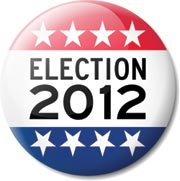Election Forecast Is for Litigation if Hurricane Sandy Hampers Voting

Image from Shutterstock.
Updated: Pundits are prognosticating how Hurricane Sandy could affect the presidential election—and produce legal issues and litigation in its wake.
Power outages, blocked roads, heavy snows and flooding are causing concern for election officials, CNN reported on Thursday. Some people may be unable to get to the polls, and some polling places may have to be cleaned up or closed because of Hurricane Sandy damage. Electronic voting could also be affected, since the machines often require consistent power to work for long hours, the story says. And in some locations, election officials were having trouble delivering voting machines to polling locations.
“This perfect storm could lead to a very imperfect election,” Moritz law professor John Fortier wrote on Monday, kicking off a series of law posts at Election Law @ Moritz.
Richard Hasen, a professor at the University of California at Irvine, laid out the scenario an an interview with the Washington Post. “If there are lingering problems, lack of power, impassable streets, closed polling places—all of those things could lead to litigation just before or on Election Day,” he said. Hasen is urging affected states to print as many backup paper ballots as possible and to open as many polling places as feasible, the Nation reports.
Power problems can have a fear reach, affecting the technology used to run elections, Fortier wrote. “Power or Internet outages could mean that voting centers cannot connect to voter registration databases and cannot have real time access to information as to whether the voter has already voted somewhere else,” he said.
States responding to Sandy could keep polls open longer or adjust polling locations, wrote Moritz law professor Steven Huefner. Provisional ballots would have to be used if hours are extended, however, producing the possibility of delayed election results and additional challenges, according to Huefner and the Associated Press.
The more difficult question, Huefner says, is whether a state could postpone an entire federal election to deal with an emergency. He believes the Constitution would allow it, but says it’s unclear whether a federal statute dealing with contingencies requires states to nonetheless hold a pro forma election on Nov. 6.
Most states have few details in their laws for dealing with disrupted elections, Fortier writes. (Florida, accustomed to dealing with hurricanes, is an exception.) As a result, state election officials and courts would have to make significant judgment calls. “Armies of lawyers from both political parties might try to intervene to ensure that no decision was made that would tip the electoral balance against their candidates,” he says.
Updated on Nov. 1 to provide additional coverage.



